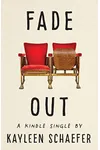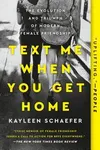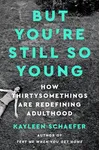Picture a New York City journalist who turned the phrase 'text me when you get home' into a rallying cry for female friendship—meet Kayleen Schaefer! With her witty, heartfelt storytelling, Schaefer has redefined how we view modern relationships, blending personal anecdotes with cultural insights. Her breakout book, Text Me When You Get Home, is a love letter to the bonds women share, proving there’s more to life than romantic plots.
Based in the bustling heart of NYC, Schaefer’s work in outlets like Vogue and The New York Times showcases her knack for capturing the pulse of contemporary life. Let’s dive into the story of a writer who’s making us rethink what it means to connect.
The Making of Kayleen Schaefer
Born and raised in Grapevine, Texas, Kayleen Schaefer grew up in a world where societal norms often pitted women against each other. A graduate of the University of Texas at Austin (BA, 2000) and later Northwestern University, she initially leaned into a male-dominated worldview, working for men’s magazines like Details. But as she navigated her twenties, Schaefer realized her true strength lay in the women around her—a revelation that would shape her career. Her early journalism, covering everything from beauty trends to pop culture, honed her sharp, relatable voice.
Moving to New York City, Schaefer found her tribe—a group of women who became her support system and inspired her to challenge stereotypes about female friendships. This personal evolution set the stage for her to become a powerful voice in nonfiction storytelling.
Kayleen Schaefer’s Unforgettable Stories
Schaefer’s debut, Text Me When You Get Home: The Evolution and Triumph of Modern Female Friendship (2018), is a game-changer. Part memoir, part sociological study, it draws on interviews with over 100 women to celebrate the power of female bonds. From Galentine’s Day to TV shows like Broad City, Schaefer traces how pop culture mirrors this shift, rejecting the 'mean girls' trope. Her conversational style feels like chatting with a best friend, making the book both accessible and profound.
Her earlier work, the Kindle Single memoir Fade Out, offers a more personal lens, recounting her search for her brother, a filmmaker who vanished from Hollywood. It’s a poignant exploration of family and identity, showcasing Schaefer’s ability to weave emotional narratives. Her latest book, But You’re Still So Young (2021), tackles the evolving milestones of thirtysomethings, from delayed marriages to career pivots, with data-driven insights and relatable stories. Across her works, Schaefer’s style is marked by empathy, humor, and a knack for spotting cultural trends.
Whether she’s writing for The New Yorker or penning books, Schaefer’s themes—friendship, identity, and defying expectations—resonate with readers navigating modern life’s complexities. Her ability to blend personal and universal makes her stories stick with you long after the last page.
Why Kayleen Schaefer Matters
Kayleen Schaefer’s impact lies in her fearless challenge to outdated narratives. By elevating female friendships to the same level as romantic or familial ties, she’s given women permission to prioritize their 'girl squads.' Her work has sparked conversations in the #MeToo era, aligning with a cultural shift toward female allyship. Publications like Elle and NPR have praised her for capturing the 'thrills and laughs' of these bonds, making her a voice for a generation redefining connection.
Schaefer’s influence extends beyond books. Her journalism continues to explore how we live, love, and grow, inspiring readers to embrace their own stories. In a world that often undervalues women’s relationships, Schaefer’s work is a vibrant reminder that friends can be the protagonists of our life’s love stories.
- Born in Grapevine, Texas
- Key works: Text Me When You Get Home (2018), Fade Out, But You’re Still So Young (2021)
- Education: BA from University of Texas at Austin, Master’s from Northwestern University
- Based in New York City
About Kayleen Schaefer
Ready to feel the love of female friendship? Snag Text Me When You Get Home and dive into Kayleen Schaefer’s witty, heartwarming world!


